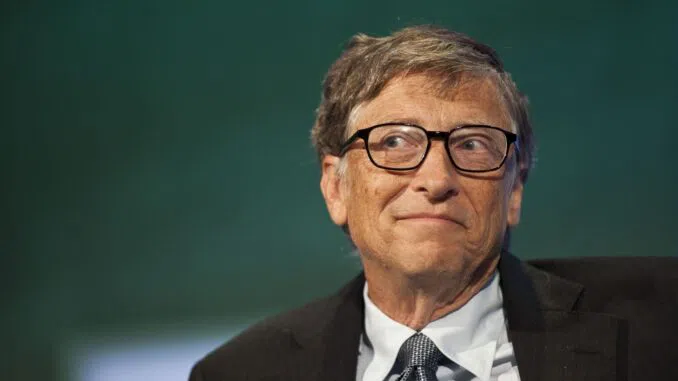-
The FDA Has Had Close Links To The Gates Foundation Since 2017

The US Food and Drug Administration (FDA) entered into a memorandum of understanding (MOU) with the Bill & Melinda Gates Foundation in 2017.
Under the MOU, the two entities agreed to share information to “facilitate the development of innovative products, including medical countermeasures,” such as diagnostics, vaccines, and therapeutics to combat disease transmission during a pandemic.
While the FDA has MOUs with several academic and non-profit organisations, few have as much to gain as Bill Gates who has invested billions into pandemic countermeasures.
The Brownstone Institute reports: Experts are concerned the Gates Foundation could have undue influence over the FDA’s regulatory decisions of these countermeasures.
David Gortler, an ex-senior adviser to the FDA commissioner between 2019 and 2021, says he is “suspicious” of the MOU.
“If the Gates Foundation establishes an MOU with a regulator on a product they want to develop, it seems like it would be a conflict of interest. What if every other drug company did the exact same thing as the Gates Foundation?” he says.
Gortler, now a fellow at the Ethics and Public Policy Center in Washington, DC, explained that normally, meetings between developers and regulators are supposed to be an official part of the public record and subject to Freedom of Information Act requests.
“However, an MOU such as this can circumvent the usual requirements for the transparency of official communications,” says Gortler. “This way their communications can be kept secret.”
David Bell, a former medical officer for the World Health Organisation (WHO) who now works as a public health physician and biotech consultant, agrees that the MOU has potential to corrupt the regulatory process.
“The narrative is that philanthropic foundations can only be good, because they’re making vaccines and saving thousands of lives, so we need to cut the red tape and help the FDA get stuff done quickly otherwise children will die,” says Bell. “But in reality, it has potential to corrupt the whole system.”
Bell adds, “Speaking generally, close relationships between regulators and developers raise inevitable risks that shortcuts and favours will breakdown the rigorousness of the product review, putting the public at risk.”
Revolving door
The FDA has been roundly criticized for its “revolving door.” Ten of the past 11 FDA commissioners left the agency and secured roles with pharmaceutical companies they once regulated.
Similarly, the Gates Foundation hired high-ranking members of the FDA, who bring with them intimate knowledge of the regulatory process.
For example, Murray Lumpkin had a 24-year career at the FDA, serving as senior advisor to the FDA commissioner and representative for global issues. Now, he is deputy director of regulatory affairs at the Gates Foundation, and signatory on the MOU.
And Margaret Hamburg, who served as FDA commissioner between 2009 and 2015, is now on the Scientific Advisory Board of the Gates Foundation.
Bell has no doubt that these appointments were strategic to “game the system” saying, “If I worked at the Gates Foundation, I would certainly hire somebody like Murray Lumpkin.”
The only way to fix the revolving door problem Bell says, is to have a ‘non-compete clause’ in their contracts.
“It might be that FDA employees cannot work for the people they’ve regulated for at least 10 years. There are places that have those rules – private companies have agreements that you can’t work for a rival,” said Bell.
The FDA dismissed questions about the potential for conflicts of interest, or the lack of transparency over its communications with the Gates Foundation. In a statement, the FDA said:
FDA regulatory decision making is science-based. Former FDA officials do not impact regulatory decisions. FDA only collaborates with the Bill and Melinda Gates Foundation under the MOU as described.
Gates has billions at stake
Gates boasted about receiving a 20-to-1 return on his $10 billion investment into the “financing and delivery” of medicines and vaccines.
“It’s the best investment I’ve ever made,” he wrote in the Wall Street Journal. “Decades ago, these investments weren’t sure bets, but today, they almost always pay off in a big way.”
In Sept 2019, just prior to the pandemic, SEC filings showed the foundation purchased over 1 million shares in BioNTech (Pfizer’s partner) for $18.10/share. By Nov 2021, the foundation dumped most of the stock for an average of $300/share.
Investigative journalist Jordan Schachtel reported the foundation pocketed approximately $260 million in profit – more than 15 times its original investment – most of it untaxed because it was invested through the foundation.
In his recent book, How to Prevent the Next Pandemic, Gates warns that future pandemics are the biggest threat to humankind and that survival depends on global pandemic preparedness strategies, firmly positioning himself at the centre of shaping the agenda.
In October 2019, the Gates Foundation and the World Economic Forum hosted Event 201, which gathered government agencies, social media companies, and national security organisations to war game a “fictional” global pandemic.



Login or Register to Leave a Comment